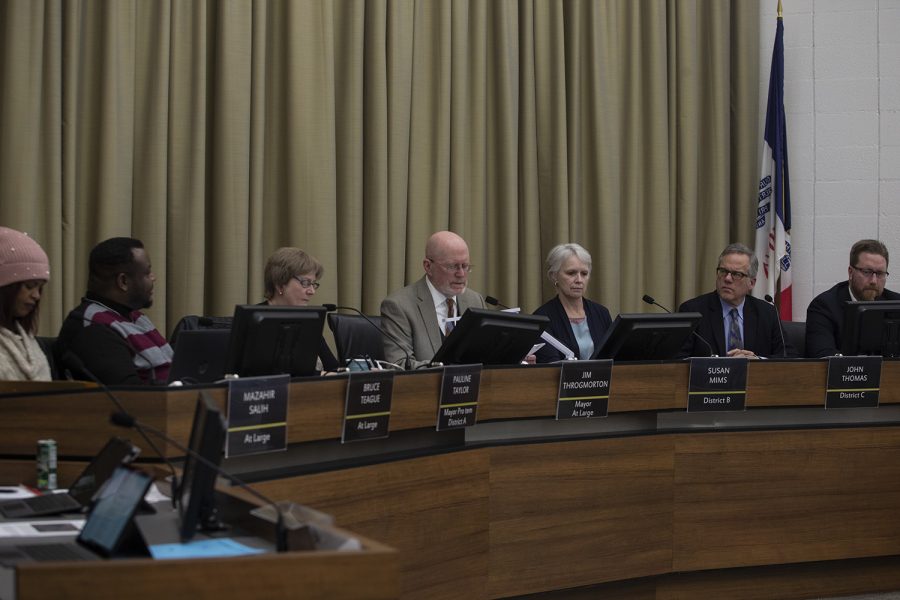City Council declares a state of climate crisis
After months of discussion, The Iowa City City Council unanimously voted for a resolution to declare a climate crisis and adjust their carbon emission reduction goals.
The council deliberates at a meeting of the Iowa City Council on February 19, 2019
August 6, 2019
The Iowa City City Council on Aug. 6 voted unanimously to pass a resolution declaring a climate crisis and taking accelerated action to address climate change.
For the past year, climate strikers from local schools and other places in the community have demanded stricter energy-efficiency regulations and the declaration of a climate emergency by the City Council.
When it comes to stricter energy regulations, according to Iowa Code, Iowa City cannot adopt plans other than the state energy code, meaning the city’s regulations cannot be stricter or more lenient than the state’s.
The goals for reducing carbon-dioxide emissions from 2005 levels, as detailed in the 85-page city Climate Action Plan, are 25 to 28 percent by 2025 and 80 percent by 2050. Despite an upward tick in emissions from 2017-18, and an upward trend since 2016, the city is ahead of schedule with a 21 percent reduction in emissions.
“A lot of this is a psychological shift that we have to have, and as leaders of our community, you have to help us as citizens have the psychological shift,” said Liz Maas, a member of the Iowa City Climate Action Steering Committee and early proponent of a declaration of a climate emergency.
The resolution adjusts the emission-reduction goal to 45 percent reduction by 2030 and aims to reach “net zero,” offsetting carbon emissions with carbon removal, by 2050. The Intergovernmental Panel on Climate Change adopted the levels in its report of October 2018.
Sheila Zeithamel, a member of Sunrise Movement Cedar Rapids, said this was her first time at a City Council meeting. Sunrise Movement advocates political action on climate change; it rose to prominence after staging a sit-in in the office of incoming House Speaker Nancy Pelosi in November.
“If this does go through, I think the celebration should be short-lived, because we really need to roll up our sleeves and get to work,” Zeithamel said.
RELATED: Iowa City introduces new hate-crime ordinance
When describing the urgency of the situation, she cited the high temperatures at the North and South Poles, wildfires in Siberia, loss of glacial ice, and climate migration.
Councilor Mazahir Salih, now back from Sudan, noted the effects of climate change on the other side of the world. Normally in Sudan, she said, the rainy season lasts from July to September, but this year, the rain started in May, and the summer was hotter than normal.
When Salih was in Sudan, she said, people noticed a change in the weather, even if they did not necessarily know why. Mayor Jim Throgmorton said relaying these stories of weather changes in Sudan to Iowa City’s Sudanese-American community could be useful in teaching them about climate change.
Councilor Pauline Taylor said that as a grandmother of a 4-year-old and a 12-year-old, she often thinks about what their future would look like. Tackling the climate crisis and meeting the established goals is doable, she said, and the City Council would need the help of everyone in the community.
Maas and councilors such as Taylor said education is a crucial component to tackling climate change. Maas said there needs to be a paradigm shift in how people think and go about their lives.
“Given the time frame we’re dealing with, which is daunting to say the least, this will have to result in a cultural shift to be successful,” Councilor John Thomas said. “And it’s going to have to be something that permeates how we think, and how we live our lives, and how we conduct our business.”



